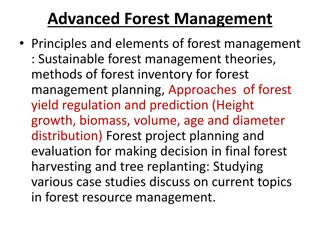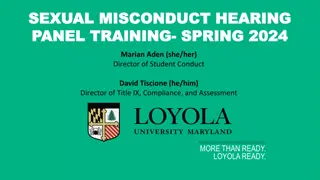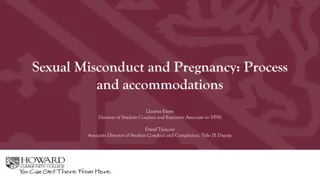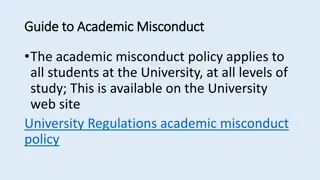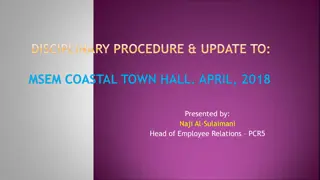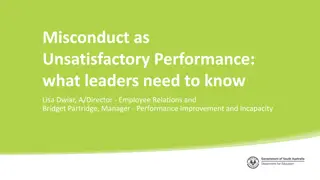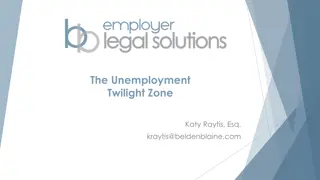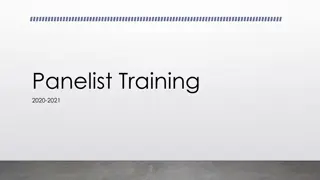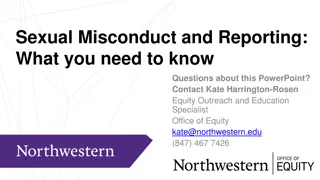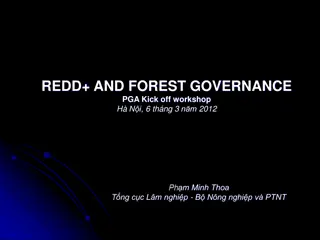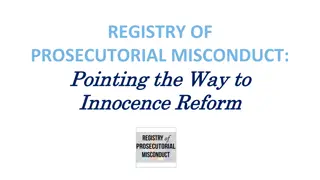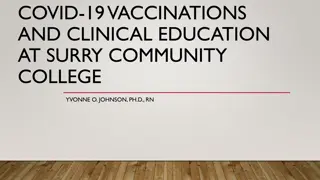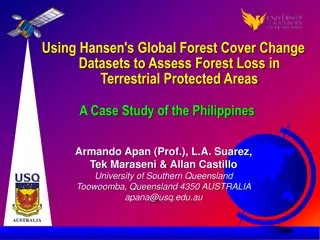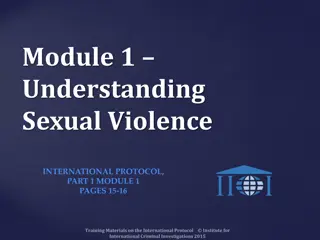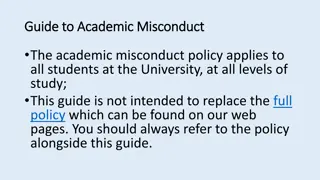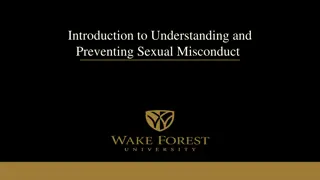Understanding and Preventing Sexual Misconduct at Wake Forest University
Welcome to Wake Forest University's educational module on Understanding and Preventing Sexual Misconduct. This module covers behaviors constituting unlawful sexual misconduct, responsibilities for reporting, bystander intervention, ways to reduce risk, avenues to report, and receive support. Wake Forest University strictly prohibits offenses like domestic violence, dating violence, sexual assault, sexual harassment, and stalking, all under the umbrella term of sexual misconduct.
Download Presentation

Please find below an Image/Link to download the presentation.
The content on the website is provided AS IS for your information and personal use only. It may not be sold, licensed, or shared on other websites without obtaining consent from the author. Download presentation by click this link. If you encounter any issues during the download, it is possible that the publisher has removed the file from their server.
E N D
Presentation Transcript
Introduction to Understanding and Preventing Sexual Misconduct
Welcome! Welcome to Wake Forest University s Introduction to Understanding and Preventing Sexual Misconduct. The Title IX Office has collaborated with the School of Business Integrative Student Services Center of Excellence in creating this educational module for students enrolled in the MBA program. All students have a fundamental right to receive information regarding the University Student Sexual Misconduct Policy as well as information about available resources for those struggling with issues involving sexual misconduct.
Objectives Through the next few slides you will receive an overview of: What behaviors constitute unlawful sexual misconduct and create a hostile work and academic environment. The responsibilities of faculty, staff, and students for reporting sexual misconduct. Safe and positive options for bystander intervention as well as ways to reduce risk. The avenues available at to report sexual misconduct as well as to receive support.
Wake Forest Universitys Commitment Wake Forest University strives to achieve and maintain equal opportunity, inclusiveness, equitable treatment, and access to employment, education, and services for all individuals. As part of that commitment, Wake Forest University strictly prohibits the offenses of: domestic violence, dating violence, sexual assault, sexual harassment, and stalking. As defined in the Student Sexual Misconduct Policy, the term sexual misconduct is an umbrella term used to encompass all such offenses. 4
What is sexual harassment? Sexual harassment is any unwelcome sexual advances or requests for sexual favors or any conduct of a sexual nature when: Submission to such conduct is either overtly expressed or subtly suggested; and Submission to or rejection of the conduct is used as a basis for employment (or academic) decisions; or Such conduct creates a hostile environment.
Quid Pro Quo vs. Hostile Environment The term quid pro quo ("this for that") refers to situations in which an employment (or academic) action resulted from a refusal to submit to a superior's sexual demands or submission to unwanted sexual demands. The term "hostile environment" refers to situations where requests for sexual favors or physical behavior with sexual overtones are severe or pervasive enough to unreasonably impact an employee's work performance or a student's ability to participate in or benefit from University programs. Both are forms of sexual harassment and the labels of quid pro quo ("this for that") and "hostile environment" are used for ease of explanation.
Hostile environment may be created through unwelcome, severe or pervasive acts Physical Verbal Visual Suggestive comments Off-color jokes Comments on physical attributes Discussions of sexual exploits Lewd voice mail messages Sexual advances Fondling Shoulder massages Pinching Grabbing Lewd hand gestures Leering Sexually suggestive pictures, photos, cartoons, screen savers Lewd e-mails or texts Sexually suggestive posts on social media Facebook pictures with sexual overtones
What is Sexual Assault? Sexual Assault is defined as an offense classified as a forcible or non-forcible sex offense. Sexual assault includes, but is not limited to: Non-consensual attempted or completed penetration. Attempted or completed penetration (anal, oral or vaginal), however slight, with any body part or any object, by a person upon another person, without effective consent. This includes vaginal penetration by a penis, object, tongue or finger; anal penetration by a penis, object, tongue or finger; and oral copulation (mouth to genital contact or genital to mouth contact). Sexualized touching (including disrobing or exposure), however slight, with any body part or any object, by a person upon another person, without effective consent. Sexual touching includes any contact with the breasts, buttocks, groin, or genitals, or touching another with any of these body parts, or making another touch the other person or themselves with or on any of these body parts, when such touching would be reasonably and objectively offensive. Sexual exploitation, defined as taking non-consensual, unjust or abusive sexual advantage of another, for one s own advantage or benefit; or to benefit or advantage anyone other than the one being exploited (e.g., videotaping).
What is effective consent? The University s definition of sexual misconduct mandates that each participant obtains and gives effective consent in each instance and before each sexual act. Consent is informed, freely and actively given, and mutually understandable words or actions that indicate a willingness to participate in mutually agreed-upon sexual activity. Consent is mutually understandable when a reasonable person would consider the words or actions of the parties to have manifested a mutually understandable agreement between them to engage in certain conduct with each other. Consent cannot be gained by ignoring or acting in spite of the objections of another. Consent can be withdrawn at any time and for any reason.
What is effective consent? In other words, consent cannot be inferred from: Silence, passivity, acceptance, or lack of resistance alone; A current or previous dating or sexual relationship (or the existence of such a relationship with anyone else); Attire; Consent given to another person (i.e., consent to engage in sexual activity with one person does not imply consent to engage in sexual activity with another person); or Consent previously given (i.e., consenting to one sexual act does not imply consent to another sexual act).
What is effective consent? Further, consent is not effective if it is obtained through the use of physical force, violence, duress, intimidation, coercion or the threat (expressed or implied) of bodily injury. Effective consent will never exist where a person is incapacitated (whether as a result of drugs, alcohol or otherwise), unconscious, or asleep.
Consent May Never Be Given By: Minors under the age of 16 (in North Carolina) Mentally disabled persons Persons who are incapacitated as a result of alcohol or other drugs or who are unconscious or otherwise physically helpless. Incapacitation means being in a state where a person lacks the capacity to appreciate the nature of giving consent to participate in sexual activity.
What is Stalking or Cyberstalking? Stalking or cyberstalking, which are forms of sex intimidation, is defined as engaging in a course of conduct (2 acts) directed at a specific person (in person or through electronic means) that would cause a reasonable person to: Fear for the individual's safety or the safety of others; or Suffer substantial emotional distress.
What is Dating Violence? Dating violence is defined as violence committed by a person: Who is or has been in a social relationship of a romantic or intimate nature with the victim; and Where the existence of such a relationship shall be determined based on a consideration of the following factors: The length of the relationship The type of relationship The frequency of interaction between the persons involved in the relationship.
What is Domestic Violence? Domestic violence is violence committed by a current or former spouse of the victim, by a person with whom the victim shares a child in common, by a person who is cohabitating with or has cohabitated with the victim as a spouse, by a person similarly situated to a spouse of the victim under the domestic or family violence laws of the State of North Carolina, or by any other person against an adult or youth victim who is protected from that person s acts under the domestic or family violence laws of the State of North Carolina. Violence includes one or more of the following acts : Attempting to cause bodily injury, or intentionally causing bodily injury; or Placing the aggrieved party or a member of the aggrieved party's family or household in fear of imminent serious bodily injury or continued harassment that rises to such a level as to inflict substantial emotional distress.
What should I do if I observe any of these forms of sexual misconduct? There are 3 easy steps: 1. Recognize a situation is potentially offensive or dangerous; 2. Assume personal responsibility for doing something about it; and, 3. Take some form of action.
Remember the 4 Ds 1. Delegate: If you believe that you are witnessing sexual misconduct, violence, or threats thereof, immediately report this to security or local police and/or to the local police. Also, contact the Title IX Office. 2. Distract: If safe to do so, interrupt the interaction and then privately follow-up with the person who is the target of the offense to talk about confidential options, such as employee assistance, Student Health Services and about options to report the harassment to the police or the Title IX Office. 3. Direct: Talk with the initiator of the unwelcome behavior to inform him or her that the behavior is making you uncomfortable and may violate WFBMC policy. 4. Delay: It is never too late submit a report to the Title IX Office or the police.
If I disclose sexual misconduct to my professor, what are the professor s responsibilities? Faculty and staff who become aware of possible sexual misconduct or harassment must promptly notify the Title IX Coordinator even if an individual requests confidentiality. Required by federal law. Protects the safety of the student(s) involved and the entire campus community. Title IX Coordinator may have information about the incident and/or the students/employees that others may not have. For this reason, we strongly encourage you to contact the Safe Office or another confidential resource to discuss reporting options in a confidential setting.
How can I reduce my risk of being a victim or accused of sexual misconduct? Wake Forest believes that it is more beneficial to prevent crimes than to react after the fact. A primary vehicle for accomplishing this goal is a comprehensive crime prevention strategy that includes general safety and crime prevention tips for all members of our community. Watch out for your friends and have your friends watch out for you. Be aware of your surroundings. Make sure your cell phone is charged and accessible. If you suspect you or a friend has been drugged, contact law enforcement immediately (local authorities can be reached by calling 911 in most areas of the U.S.). Tell a friend where you are going and when you will return. If you need to get out of an uncomfortable or frightening situation, here are some things that you can try: Remember that being in this situation is not your fault. You did not do anything wrong, it is the person who is making you uncomfortable that is to blame. Use a Campus Emergency Phone, if available. Campus Blue Lights and Call Box Phones are located throughout campus to provide assistance to anyone in distress. Activate the light and keep moving. Ask for a safety escort. Have a code word with your friends or family. If you don t feel comfortable you can call them and communicate your discomfort without the person you are with knowing. Your friends or family can then come to get you or make up an excuse for you to leave. Lie.If you don t want to hurt the person s feelings it is better to lie and make up a reason to leave than to stay and be uncomfortable or scared. Some excuses you could use are: needing to take care of a friend or family member, not feeling well, having somewhere else that you need to be, etc. Try to think of an escape route. How would you try to get out of the room? Where are the doors? Windows? Are there people around who might be able to help you? Is there an emergency phone nearby?
Can employees or students who complain be disciplined? No, if the discipline is punishment for harassment complaints. Wake Forest does not tolerate retaliation in any form. "Retaliation" means "punishing" individuals because of their complaints. Demotion or termination Significant changes in working conditions, locations or assignments Reductions in compensation, salary or status
What are the sanctions for engaging in sexual misconduct? Wake Forest holds violators accountable for their actions and issues sanctions, consistent with employees' and students rights and when warranted for violations of the sexual misconduct policy. The severity of a sanction depends upon the extent of the violation but includes a wide range of actions, including termination, demotion, suspension, expulsion, probation, and training. Case by case basis.
You have many reporting options. Title IX Coordinator or Title IX Deputy Coordinator Tanya L. Jachimiak, JD, Title IX Coordinator, 336.758.7258, jachimtl@wfu.edu or titleixcoordinator@wfu.edu Matt Imboden, Exec Dir, Integrative Student Services, 336.758.1896, Farrell Hall 115, imbodemw@wfu.edu Compliance Hotline 1.877.880.7888 or www.tnwinc.com/reportline University Police Emergency Calls: 336.758.5911 or Non-Emergency: 336.758.5591 Local Police 911
If you would like support or discuss reporting options confidentially SAFE Office (Confidential) 24/7 Hotline: 336.758.5285 safe@wfu.edu University Counseling Center (Confidential) 336.758.5273 http://counselingcenter.wfu.edu Office of Chaplain (Confidential) 336.758.5210 http://chaplain.wfu.edu Winston-Salem Family Services (Confidential) Domestic Violence Hotline: 336.723.8125 Sexual Assault Hotline: 336.722.4457
What happens after I report to the Title IX Coordinator? The Title IX Coordinator will: Ensure that complainant and/or reporting party are safe and in contact with a confidential resource. Explore interim measures, accommodations for all parties. Conduct an impartial, fair review and investigation, including gathering relevant documents, witness interviews, etc Determine whether there is cause for matter to proceed to a hearing or to a review board (depending upon policy) Additional information regarding Title IX, reporting and resources can be found at titleix.wfu.edu.
Thank You! The University thanks you for taking the time to carefully review this introduction to sexual misconduct prevention. If you have questions or would like to explore ways in which to become more involved in sexual misconduct prevention efforts, please contact: WFU School of Business Integrative Student Services: Matt Imboden, Exec Director, Integrative Student Services, 336.758.1896, imbodemw@wfu.edu Reynolda Campus programs: 115 Farrell Hall, Student Engagement Suite WFU Charlotte Center programs: 200 N. College Street, #150 Title IX Office: Tanya L. Jachimiak, Title IX Coordinator, 336.758.7258, jachimtl@wfu.edu



